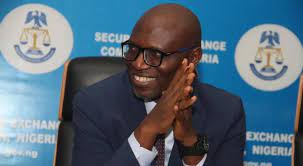The Securities and Exchange Commission (SEC) has unveiled the reviewed National Universities Commission (NUC) curriculum on Securities and Investment Management (SIM), describing financial literacy as a vital life skill and a survival tool in today’s rapidly evolving economy.
Speaking at the formal handover of the revised curriculum in Abuja on Tuesday, the Director-General of the SEC, Dr. Emomotimi Agama, said the initiative represents a strategic leap toward integrating financial education into Nigeria’s national learning framework. He emphasized that financial literacy is no longer optional but essential for national development and inclusive economic growth.
“This engagement signifies not only institutional collaboration but also our collective resolve to build a foundation for sustainable financial empowerment in Nigeria,” Agama said.
“Our gathering today goes beyond policy harmonisation or curriculum design. It is about shaping the financial mindset of future generations, equipping young Nigerians with the tools to make informed choices and contribute meaningfully to our development.”
According to him, financial literacy determines how individuals earn, save, invest, and build wealth. It also influences how citizens engage with the financial system, ensuring they are not left behind in an increasingly digital and knowledge-driven global economy.
Agama noted that the SEC remains deeply committed to embedding financial inclusion as a cornerstone of national development, beginning with education where knowledge and values are first shaped. He explained that the collaboration with the NUC seeks to integrate financial education into the national curriculum from the primary through tertiary levels, ensuring that financial awareness is cultivated early.
“This initiative recognizes that financial discipline and awareness are best nurtured early, when curiosity is highest and habits are still forming,” he stated. “Early intervention is key to producing responsible, confident, and financially empowered citizens.”
The SEC chief disclosed that pilot programmes launched in Nasarawa and Ibadan have recorded encouraging results, showing strong adaptability and enthusiasm among both teachers and students. He said these early successes affirm that when given the right tools and guidance, Nigerian youth can quickly grasp and apply financial concepts such as saving, investing, budgeting, and responsible financial decision-making.
“Beyond imparting knowledge, this effort is about empowerment, giving young people the confidence to participate productively in financial and capital markets,” Agama added.
“As the apex regulator, the SEC’s dual mandate to protect investors and deepen the market cannot be achieved in isolation from an informed, financially literate populace.”
He stressed that embedding financial education into the national curriculum represents an investment in human capital, which he described as the most critical driver of sustainable, inclusive, and resilient economic growth.
Agama also commended the NUC for its pivotal role in harmonizing academic standards and ensuring that learning outcomes align with the evolving dynamics of Nigeria’s economy.
“This partnership strengthens the bridge between education and enterprise, between classroom theory and the financial realities of everyday life,” he said. “We envision a Nigeria where every student, regardless of background, understands the value of money, the principles of investment, and the discipline of financial planning.”
The SEC boss maintained that the initiative comes at a critical time when Nigeria is pursuing the goal of building a trillion-dollar economy anchored on innovation, knowledge, and inclusive growth.
He pledged that the Commission would sustain its support for curriculum development, teacher training, resource provision, and stakeholder collaboration to ensure the nationwide rollout of the programme.
“Together, we can institutionalize a financial literacy framework that not only empowers the youth but also strengthens the moral and economic fabric of our society,” Agama said.
In his remarks, the Chairman of the SEC-appointed Committee of Experts, Prof. Uche Uwaleke, said the committee’s mandate was to review and expand the existing university curriculum to reflect current developments in securities and investment management, aligning academic instruction with global trends and the modern capital market environment.
He disclosed that the committee also designed a Basic Course in Capital Market Studies to be taken by all first-year students across Nigerian universities, aimed at promoting early exposure to capital market principles and deepening financial inclusion.
“This initiative is inspired by the recognition that awareness and understanding of the capital market remain relatively low, especially among young Nigerians,” Uwaleke said. “By introducing this foundational course, we aim to promote capital market literacy and produce a generation of financially conscious citizens.”
According to him, the committee held eight meetings—seven virtual and one in-person—during which it engaged in extensive research, consultations, and deliberations with stakeholders from academia and the capital market.
He said the team also recommended that the basic course be extended to all tertiary institutions, including polytechnics and colleges of education, to ensure the culture of financial literacy is mainstreamed across Nigeria’s entire educational ecosystem.
“As we present this report today, we do so with a sense of fulfilment and optimism,” Uwaleke stated. “We believe that its implementation will mark a major milestone in building a financially literate generation and strengthening the foundation for a vibrant, inclusive, and globally competitive Nigerian capital market.”
The SEC’s curriculum reform initiative, observers say, could become a defining step toward empowering Nigeria’s youth with the knowledge and confidence to participate in the country’s evolving financial landscape, a critical prerequisite for achieving sustainable economic growth and investor inclusion.





